|
Books Should Be Free Loyal Books Free Public Domain Audiobooks & eBook Downloads |
|
|
Books Should Be Free Loyal Books Free Public Domain Audiobooks & eBook Downloads |
|
Religion |
|---|
Book type:
Sort by:
View by:
|
By: Leo Tolstoy (1828-1910) | |
|---|---|
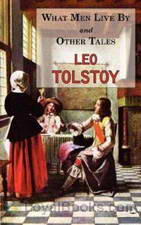 What Men Live By and Other Tales
What Men Live By and Other Tales
Although Leo Tolstoy (1828-1910) was a wealthy landowner, in his later life he had what was considered a “religious awakening.” This experience went on to inform his writing and his lifestyle in profound ways. His views transcended the specifics of religion, as known in his day – so much so he came to be a helpful guide both to Mohandas Gandhi and to Dr. Martin Luther King Jr. The four stories in this collection ask profound questions and gently supply helpful, non-dogmatic hints to their... | |
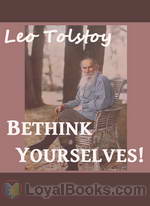 Bethink Yourselves!
Bethink Yourselves!
As Russia goes to war against Japan, Tolstoy urges those at all levels of society, from the Tsar down to the common soldier, to consider their actions in the light of Christ's teaching. "However strange this may appear, the most effective and certain deliverance of men from all the calamities which they inflict upon themselves and from the most dreadful of all—war—is attainable, not by any external general measures, but merely by that simple appeal to the consciousness of each separate man which, nineteen hundred years ago, was proposed by Jesus—that every man bethink himself, and ask himself, who is he, why he lives, and what he should and should not do... | |
By: Mark Twain (1835-1910) | |
|---|---|
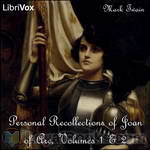 Personal Recollections of Joan of Arc, Volumes 1 & 2
Personal Recollections of Joan of Arc, Volumes 1 & 2
Mark Twain’s work on Joan of Arc is titled in full “Personal Recollections of Joan of Arc, by the Sieur Louis de Conte.” De Conte is identified as Joan’s page and secretary. For those who’ve always wanted to “get behind” the Joan of Arc story and to better understand just what happened, Twain’s narrative makes the story personal and very accessible. The work is fictionally presented as a translation from the manuscript by Jean Francois Alden, or, in the words of the published book, “Freely Translated out of the Ancient French into Modern English from the Original Unpublished Manuscript in the National Archives of France... | |
By: Unknown | |
|---|---|
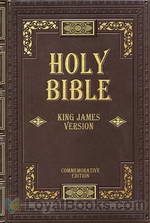 The Bible, King James Version (KJV) - Introduction
The Bible, King James Version (KJV) - Introduction
Variously known as the Greatest Story Ever Told, The Book of Books and many other names, the Bible is reputed to be the biggest bestseller of all time. Translated into thousands of world languages and studied, worshiped and revered in the four corners of the earth, the Bible remains Christianity's canonical text and is considered the Word of God. The King James Version (KJV) is a translation commissioned by the Church of England in 1604 and the work continued till 1611. However, it wasn't the first translation into English from the original Hebrew, and some portions in Aramaic... | |
By: Frances Hodgson Burnett (1849-1924) | |
|---|---|
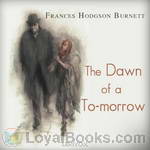 The Dawn of a To-morrow
The Dawn of a To-morrow
A wealthy London business man takes a room in a poor part of the city. He is depressed and has decided to take his life by going the next day to purchase a hand gun he had seen in a pawnshop window. The morning comes with one of those 'memorable fogs' and the adventure he has in it alters his decisions and ultimately his life. | |
By: Robert Young (1822-1888) | |
|---|---|
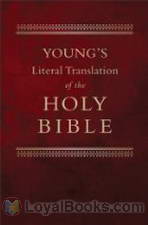 The Bible, Young's Literal Translation (YLT) - Genesis
The Bible, Young's Literal Translation (YLT) - Genesis
Young's Literal Translation is a translation of the Bible into English, published in 1862. The translation was made by Robert Young, compiler of Young's Analytical Concordance to the Bible and Concise Critical Comments on the New Testament. Young produced a "Revised Version" of the translation in 1887. After he died on October 14, 1888, the publisher in 1898 released a new Revised Edition.Young's Literal Translation in the 1898 Edition also consistently renders the Hebrew Tetragrammaton (divine name)... | |
By: Alexandre Dumas (1802-1870) | |
|---|---|
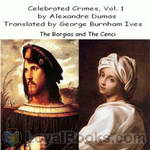 Celebrated Crimes
Celebrated Crimes
Dumas's 'Celebrated Crimes' was not written for children. The novelist has spared no language -- has minced no words -- to describe the violent scenes of a violent time.In some instances facts appear distorted out of their true perspective, and in others the author makes unwarranted charges. The careful, mature reader, for whom the books are intended, will recognize, and allow for, this fact.The first volume comprises the annals of the Borgias and the Cenci. The name of the noted and notorious Florentine family has become a synonym for intrigue and violence, and yet the Borgias have not been without stanch defenders in history... | |
By: G. K. Chesterton (1874-1936) | |
|---|---|
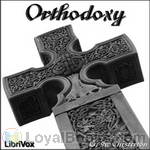 Orthodoxy
Orthodoxy
Orthodoxy is a book that has become a classic of Christian apologetics. In the book's preface Chesterton states the purpose is to "attempt an explanation, not of whether the Christian faith can be believed, but of how he personally has come to believe it." In it, Chesterton presents an original view of the Christian religion. He sees it as the answer to natural human needs, the "answer to a riddle" in his own words, and not simply as an arbitrary truth received from somewhere outside the boundaries of human experience. | |
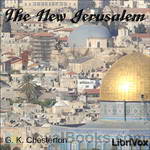 The New Jerusalem
The New Jerusalem
“On the road to Cairo one may see twenty groups exactly like that of the Holy Family in the pictures of the Flight into Egypt; with only one difference. The man is riding on the ass.” “The real mistake of the Muslims is something much more modern in its application than any particular passing persecution of Christians as such. It lay in the very fact that they did think they had a simpler and saner sort of Christianity, as do many modern Christians. They thought it could be made universal merely by being made uninteresting... | |
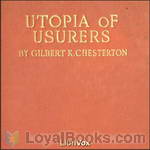 A Utopia of Usurers
A Utopia of Usurers
“Now I have said again and again (and I shall continue to say again and again on all the most inappropriate occasions) that we must hit Capitalism, and hit it hard, for the plain and definite reason that it is growing stronger. Most of the excuses which serve the capitalists as masks are, of course, the excuses of hypocrites. They lie when they claim philanthropy; they no more feel any particular love of men than Albu felt an affection for Chinamen. They lie when they say they have reached their position through their own organising ability... | |
By: H. Rider Haggard | |
|---|---|
 The Wizard
The Wizard
Described by the author, best known for his King Solomon's Mines, as "a tale of victorious faith," this story begins on a Sunday afternoon in an English church. Most of the book, though, is set in Africa, and the adventure story is as engaging as any of Haggard's African tales. What makes this one different is the religious question: What has happened to miracles in the church? Is there any power left in Jesus' promise, "Whoso that believeth in me, the works that I do he shall do also, and whatsoever ye shall ask in my name, that will I do"? | |
By: George MacDonald (1824-1905) | |
|---|---|
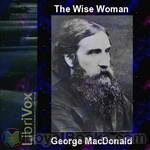 The Wise Woman
The Wise Woman
George MacDonald was an influential Scottish author, poet, and Christian minister. MacDonald’s works (particularly his fairy tales and fantasy novels) claimed the admiration of such authors as J. R. R. Tolkien, C. S. Lewis, and Madeleine L’Engle. The Wise Woman fairy tale was one of MacDonald’s more popular works. This delightful story describes how a woman of mysterious powers pays visits to two very different young girls: one a princess, the other a shepherd’s daughter. Neither girl is left unchanged by the startling events that are unleashed as a result: and the reader is confronted by astonishing fairy-worlds in which the girls are forced to choose between good and evil... | |
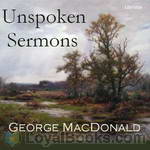 Unspoken Sermons
Unspoken Sermons
George MacDonald was a Scottish author, poet, and Christian minister. In his day he was considered one of the great Victorian authors on par with Dickens, Thackeray, Kipling and the like. His reputation as an author, however, has not fared as well largely because of the ubiquitous and fervent presence of religion throughout his works.MacDonald's theology, though sprinkled liberally throughout his fairly substantial number of books, is perhaps nowhere more palpable than in Unspoken Sermons. These sermons, though by no means amongst the most popular of MacDonald's work, have had theological impact from their first appearance... | |
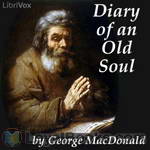 Diary of an Old Soul
Diary of an Old Soul
George MacDonald, a Scottish pastor, wrote these short poems, one for each day of the year, to help him with the severer misfortune he was experiencing. The poems are filled with hope and promises of Christ, yet, he also writes about his doubts. These poems are wonderful to listen to for people of any religion. | |
 Miracles of Our Lord
Miracles of Our Lord
Actions, it is often said, speak louder than words. But in the life of Christ - as George MacDonald shows - both spoke with an equal volume. Much attention is often devoted to what Jesus said while He was on earth, but many in our modern age are puzzled by the miracles. What are we to make of them? MacDonald - wise and gentle as ever - invites us into the miracles as a doorway into the inner life of Christ that we may intimately know Him and His Father. | |
By: Friedrich Nietzsche | |
|---|---|
 The Joyful Wisdom
The Joyful Wisdom
The Joyful Wisdom (later translated as The Gay Science), written in 1882, just before Zarathustra, is rightly judged to be one of Nietzsche’s best books. Here the essentially grave and masculine face of the poet-philosopher is seen to light up and suddenly break into a delightful smile. The warmth and kindness that beam from his features will astonish those hasty psychologists who have never divined that behind the destroyer is the creator, and behind the blasphemer the lover of life. In the retrospective... | |
By: James Allen (1864-1912) | |
|---|---|
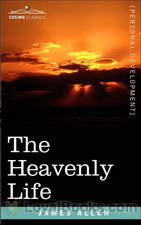 The Heavenly Life
The Heavenly Life
Many of us live with the belief that we can achieve heaven or the ultimate peace and happiness only in an after-life. Many of us believe that heaven is a place that is far removed from earth. However, The Heavenly Life by James Allen seeks to convince us that heaven and hell are both here on earth and they lie within our own selves. A deeply moving, insightful and philosophical book that explores the ideas of living with integrity, in harmony with our fellows and in finding the power of love and integrity, The Heavenly Life was first published in 1903... | |
 The Way of Peace
The Way of Peace
The Way of Peace is your guide to the power of meditation; self and truth; the acquirement of spiritual power; the realization of selfless love; entering into the infinite; saints, sages, and saviors; the law of service; and the realization of perfect peace. | |
By: John Bunyan | |
|---|---|
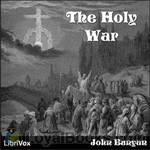 The Holy War
The Holy War
The Holy War is perhaps John Bunyan’s second most popular work, after The Pilgrim’s Progress. It tells the story of afierce battle to take control of a city from its rightful ruler. | |
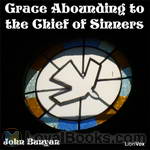 Grace Abounding to the Chief of Sinners
Grace Abounding to the Chief of Sinners
Grace Abounding is the spiritual autobiography of John Bunyan, who also penned Pilgrim’s Progress, perhaps one of the most significant pieces of Christian literature, second only to the Bible. Grace Abounding follows Bunyan’s struggle to find true repentance and forgiveness, his battle with Satan’s temptations of unbelief, his comfort found in the Bible and his overarching victory gotten by the grace of God through Jesus Christ his Son. Readers familiar with Pilgrim’s Progress will recognize... | |
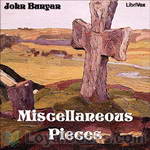 Miscellaneous Pieces
Miscellaneous Pieces
John Bunyan (November 28, 1628 – August 31, 1688), a Christian writer and preacher, was born at Harrowden (one mile south-east of Bedford), in the Parish of Elstow, England. He wrote The Pilgrim’s Progress, arguably the most famous published Christian allegory. In the Church of England he is remembered with a Lesser Festival on 30 August. Bunyan became a popular preacher as well as a prolific author, though most of his works consist of expanded sermons. In theology he was a Puritan, but there was nothing gloomy about him. The portrait his friend Robert White drew, which has often been reproduced, shows the attractiveness of his true character. | |
By: John Bunyan (1628-1688) | |
|---|---|
 Pilgrim's Progress in Words of One Syllable
Pilgrim's Progress in Words of One Syllable
The Pilgrim's Progress from This World to That Which Is to Come is a Christian allegory written by John Bunyan and published in February, 1678. It is regarded as one of the most significant works of religious English literature, has been translated into more than 200 languages, and has never been out of print. The author says in the preface " I have endeavored as far as possible to avoid hard and technical expressions, and I cannot but think that the mere fact of the brevity of the words must be a great attraction to beginners of all ages. | |
By: John Milton (1608-1674) | |
|---|---|
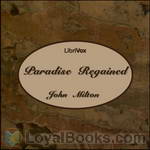 Paradise Regained
Paradise Regained
Paradise Regained is a poem by the 17th century English poet John Milton, published in 1671. It is connected by name to his earlier and more famous epic poem Paradise Lost, with which it shares similar theological themes. Based on the Gospel of Luke’s version of the Temptation of Christ, Paradise Regained is more thoughtful in writing style, and thrives upon the imagery of Jesus’ perfection in contrast to the shame of Satan. | |
By: Andrew Lang (1844-1912) | |
|---|---|
 Tales of Troy: Ulysses the Sacker of Cities
Tales of Troy: Ulysses the Sacker of Cities
These are short stories about the life of Ulysses, the stealing of Helen, Paris, battles, Trojan horses, and more! | |
 Custom and Myth
Custom and Myth
CUSTOM AND MYTHINTRODUCTION.Though some of the essays in this volume have appeared in various serials, the majority of them were written expressly for their present purpose, and they are now arranged in a designed order. During some years of study of Greek, Indian, and savage mythologies, I have become more and more impressed with a sense of the inadequacy of the prevalent method of comparative mythology. That method is based on the belief that myths are the result of a disease of language, as the pearl is the result of a disease of the oyster... | |
By: Saint Ambrose (337/340-397) | |
|---|---|
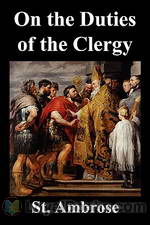 On the Duties of the Clergy
On the Duties of the Clergy
Aurelius Ambrosius was a fourth century cleric who rose to become the Archbishop of Milan in 374 AD. His father was a powerful Roman general and the prefect of Gaul. His brother and sister were also consecrated as saints by the Catholic Church. As an infant, a swarm of bees settled over his face and flew away without harming the baby, but left behind a drop of honey and this was seen as a sign of his future eloquence and bees are often painted in his portraits as his symbols. Ambrosius (or Ambrose as he is referred to in English) was a highly learned man, well versed in Latin and Greek, theology and many other subjects... | |
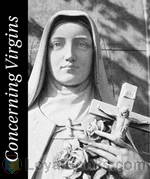 Concerning Virgins
Concerning Virgins
Concerning Virgins (De Virginibus) is a series of letters, compiled into three “books,” St. Ambrose wrote to his sister, Manellia, These, perhaps Ambrose’s earliest writings, were written in 377 CE. Written in a rather light-handed non-technical style they appear as ethical guides to women who are contemplating entering nunneries. More importantly, they set the tone for Ambrose’s later writing on ethics. Concerning Virgins was referred to by other patristic writers including St. Jerome, St Augustine and Cassian, and are now included in the extra-biblical cannon of the early church fathers. | |
By: Robert Michael Ballantyne (1825-1894) | |
|---|---|
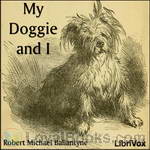 My Doggie and I
My Doggie and I
This story surrounds a child waif, a young woman, a young gentleman doctor, and an elderly lady. This tale unfolds the story of a bond that brings these unlikely friends together and merges their separate paths of life into one common path. The bond is "Dumps", or "Pompey", the "doggie". With many twists, turns, and uncertainties, the ending may surprise the reader. All's well that ends well in this doggie "tail". (Introduction by Allyson Hester) | |
By: John Donne (1572-1631) | |
|---|---|
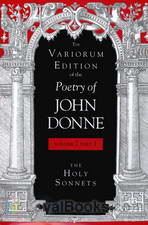 Holy Sonnets
Holy Sonnets
John Donne (1572 – March 31, 1631) was a Jacobean poet and preacher, representative of the metaphysical poets of the period. His works, notable for their realistic and sensual style, include sonnets, love poetry, religious poems, Latin translations, epigrams, elegies, songs, satires and sermons. His poetry is noted for its vibrancy of language and immediacy of metaphor, compared with that of his contemporaries. Towards the end of his life Donne wrote works that challenged death, and the fear that it inspired in many men, on the grounds of his belief that those who die are sent to Heaven to live eternally... | |
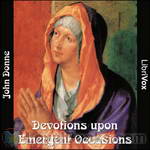 Devotions upon Emergent Occasions
Devotions upon Emergent Occasions
Devotions upon Emergent Occasions is a 1624 prose work by the English writer John Donne. It is a series of reflections that were written as Donne recovered from a serious illness, believed to be either typhus or relapsing fever. (Donne does not clearly identify the disease in his text.) The work consists of twenty-three parts describing each stage of the sickness. Each part is further divided into a Meditation, an Expostulation, and a Prayer. The seventeenth meditation is perhaps the best-known part of the work... | |
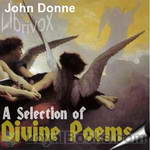 A Selection of Divine Poems
A Selection of Divine Poems
John Donne was an English Jacobean preacher, sometime lawyer, later in life a Member of Parliament and Royal Chaplain. Marrying for love against the wishes of his influential father-in-law; Donne's career was cast into shadow: forcing him to support his wife, Anne, as best he might under a specter of unforgiving penury. Despite such hardships - perhaps because of them - Donne's writings demonstrate a mastery of poetry layered with metaphysical meaning and mystery: which continues to delight and challenge modern-day readers... | |
By: Saint Augustine of Hippo (354-430) | |
|---|---|
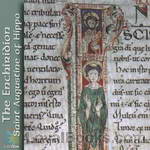 The Enchiridion
The Enchiridion
The Enchiridion, Manual, or Handbook of Augustine of Hippo is alternatively titled, “Faith, Hope, and Love”. The Enchiridion is a compact treatise on Christian piety, written in response to a request by an otherwise unknown person, named Laurentis, shortly after the death of Saint Jerome in 420. It is intended as a model for Christian instruction or catechesis. – As the title indicates, the work is organized according to the three graces necessary for the Christian worship of God: Faith, Hope and Love... | |
By: Andrew Murray (1828-1917) | |
|---|---|
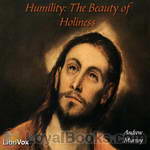 Humility : The Beauty of Holiness
Humility : The Beauty of Holiness
A book on the all importance of humility, how Jesus was humble, and how we also can become humble. Murray wrote “Without humility, there can be no true abiding in God’s presence or experience of His favor and the power of His spirit. Without it there can be no abiding faith or love or joy or strength.” | |
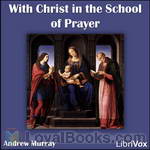 With Christ in the School of Prayer
With Christ in the School of Prayer
It is under a deep impression that the place and power of prayer in the Christian life is too little understood, that this book has been written. I feel sure that as long as we look on prayer chiefly as the means of maintaining our own Christian life, we shall not know fully what it is meant to be. But when we learn to regard it as the highest part of the work entrusted to us, the root and strength of all other work, we shall see that there is nothing that we so need to study and practise as the art of praying aright... | |
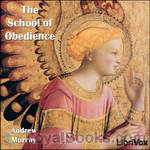 The School of Obedience
The School of Obedience
Andrew Murray describes the necessity and benefits of absolute obedience to God. He goes on to explain the way to achieve this level of obedience, which is required of all believers, and attainable through God’s provision. | |
 Holy in Christ Thoughts on the Calling of God's Children to be Holy as He is Holy
Holy in Christ Thoughts on the Calling of God's Children to be Holy as He is Holy
In introducing this book, which Andrew Murray sub-titled “Thoughts on the Calling of God’s Children to Be Holy as He is Holy”, I can do no better than to quote from the author’s own Preface: “It has been my earnest desire that I might be a helper of the faith of my brethren in seeking to trace with them the wondrous revelation of God’s Holiness through the ages as recorded in His blessed Word. It has been my continual prayer that God might use what is written to increase in His children the conviction that we must be holy, the knowledge of how we are to be holy, the joy that we may be holy, the faith that we can be holy... | |
 'Jesus Himself'
'Jesus Himself'
Is it possible to be familiar with Jesus, to know the Bible, to be involved in church life, and yet not really know Jesus at all well? Andrew Murray, with his perceptive insights into the church of his day, and indeed of ours too, shows how this is all too often the condition of many believers. In the two essays comprising this book, Murray shows how we can move to a new place in really knowing Jesus, and how the presence of the Lord can become much more real to us. There is a cost, but God always abundantly rewards those who seek Him with their whole heart. | |
By: John Stuart Mill (1806-1873) | |
|---|---|
 Auguste Comte and Positivism
Auguste Comte and Positivism
Part 1 lays out the framework for Positivism as originated in France by Auguste Comte in his Cours de Philosophie Positive. Mill examines the tenets of Comte's movement and alerts us to defects. Part 2 concerns all Comte's writings except the Cours de Philosophie Positive. During Comte's later years he gave up reading newspapers and periodicals to keep his mind pure for higher study. He also became enamored of a certain woman who changed his view of life. Comte turned his philosophy into a religion, with morality the supreme guide. Mill finds that Comte learned to despise science and the intellect, instead substituting his frantic need for the regulation of change. | |
By: Saint Thomas Aquinas (1225-1274) | |
|---|---|
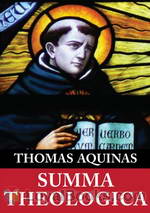 Summa Theologica, Pars Prima
Summa Theologica, Pars Prima
More than nine hundred years after it was first written, this unfinished work of a scholar saint still has the power to move our minds and hearts and set us thinking on the really important questions of life. Summa Theologica or simply the Summa as it is known, was written some time between 1265-74. It is a work that has had a profound and enduring influence on Western thought and literature. Designed to provide answers to Catholic theologians about the teachings of the Church, Thomas Aquinas' book instead goes far beyond its stated purpose... | |
By: Kate Douglas Wiggin | |
|---|---|
 The Old Peabody Pew: A Christmas Romance of a Country Church
The Old Peabody Pew: A Christmas Romance of a Country Church
A sweet, old fashioned Christmas romance set in an old New England meeting house. | |
By: Unknown | |
|---|---|
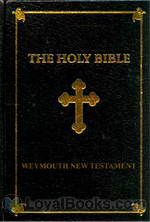 The Bible, Weymouth New Testament (WNT) - Matthew
The Bible, Weymouth New Testament (WNT) - Matthew
The Weymouth New Testament ("WNT"), otherwise known as The New Testament in Modern Speech or The Modern Speech New Testament, is a translation into "modern" English as used in the nineteenth century from the text of The Resultant Greek Testament by Richard Francis Weymouth from the Greek idioms used in it. It was later edited and partly revised by Reverend Ernest Hampden-Cook in London, England. Publishers: Baker and Taylor Company (New York) in 1903 and James Clarke & Co (London) in 1903.Richard Francis Weymouth's popular translation of the New Testament into English was first published in 1903 and has been in print through numerous editions ever since with millions of copies sold... | |
By: David Hume (1711-1776) | |
|---|---|
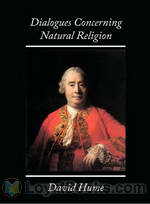 Dialogues Concerning Natural Religion
Dialogues Concerning Natural Religion
In Dialogues Concerning Natural Religion, philosopher David Hume examines whether belief in God can be rational. The work takes the form of a debate between three characters: Cleanthes, who argues that the existence and nature of God can be empirically verified; Demea, who argues that God is completely beyond human knowledge; and Philo, a philosophical skeptic widely thought to represent Hume’s own beliefs. Much of the debate centers around Cleanthes’ presentation of the analogical argument from design... | |
By: Francis Bacon (1561-1626) | |
|---|---|
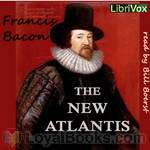 The New Atlantis
The New Atlantis
In 1623, Francis Bacon expressed his aspirations and ideas in New Atlantis. Released in 1627, this was his creation of an ideal land where people were kind, knowledgeable, and civic-minded. Part of this new land was his perfect college, a vision for our modern research universities. Islands he had visited may have served as models for his ideas. | |
By: Louis Ginzberg (1873-1953) | |
|---|---|
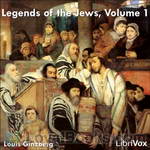 Legends of the Jews
Legends of the Jews
Rabbi Louis Ginzberg was one of the outstanding Talmudists of the twentieth century. He was born on November 28, 1873, in Kovno, Lithuania; he died on November 11, 1953, in New York City. Ginzberg taught at the Jewish Theological seminary from 1903 to 1953. For 50 years, he trained two generations of Conservative Rabbis.The Legends of the Jews is an epic 7-volume compilation of traditional Jewish stories loosely related to the Bible. Volumes 1-4 contain the stories, while volumes 5-7 contain Ginzberg’s notes and commentary... | |
By: Anatole France (1844-1924) | |
|---|---|
 Thais
Thais
The fourth century ascetic Paphnuce, journeys from his remote desert hermitage to urban Alexandria determined to locate the stunningly beautiful and libertine actress, Thais. He earnestly desires that she convert to Christianity. Gaining an audience by deception, the hermit passionately speaks to the actress of eternity. Remarkably, Thais repents and retires to a convent for the rest of her days. The hermit however, cannot rid his mind of her charms, not even with the help of the most severe austerities. After years of anguish the monk learns of Thais' immanent demise and hastens to her side. There he confesses the unspeakable. | |
 Revolt of the Angels
Revolt of the Angels
Anatole France, in his satirical and allegorical fashion, weaves a tale of fantasy which finds a mischievous guardian angel stealing books from his earthly charge, who happens to be an archbishop in possession of a plethora of literature, mostly theological in nature. After voracious reading and then becoming a "fallen" angel, he decides to search for and recruit other "fallen" angels who devise a plan to attempt an overthrow of the rule which had set their fate, realizing that revolt is necessary and inevitable... | |
By: Upton Sinclair (1878-1968) | |
|---|---|
 The Profits of Religion
The Profits of Religion
The Profits of Religion: An Essay in Economic Interpretation is a non-fiction book by the American novelist and muckraking journalist Upton Sinclair, first published in 1917. It is a snapshot of the religious movements in the U.S. before its entry into World War I. In this book, Sinclair attacks institutionalized religion as a "source of income to parasites, and the natural ally of every form of oppression and exploitation." | |
By: Israel Zangwill (1864-1926) | |
|---|---|
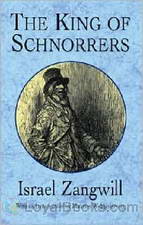 The King of Schnorrers
The King of Schnorrers
Manasseh da Costa is a schnorrer (beggar) who lives on the charitable contributions of the Jews of late 18th-century London. But Manasseh is far from being a humble panhandler for, as every schnorrer knows, supporting the poor is a commandment from God (a mitzvah) not just a favour. And as the descendant of Portuguese Jews who had lived in England for many generations, Manasseh is the social superior of those newly arrived from Eastern Europe (called ‘Tedesco’), even his wealthy patron Joseph Grobstock... | |
 Children of the Ghetto
Children of the Ghetto
In this 1892 novel of London's Jewish East End, Israel Zangwill sets the apparently irrational and decidedly indecorous religious practices of transplanted eastern European Jews against the forces of assimilation. Zangwill's knowledge of Yiddishkeit and skill in melodrama created a series of unforgettable vignettes that had a significant effect on the public perception of this much stigmatized immigrant group. Israel Zangwill (1864-1926) was born in London of Russian and Polish parents. He coined the term cultural "melting pot". | |
By: Henry van Dyke (1852-1933) | |
|---|---|
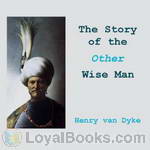 The Story of the Other Wise Man
The Story of the Other Wise Man
You know the story of the Three Wise Men of the East, and how they travelled from far away to offer their gifts at the manger-cradle in Bethlehem. But have you ever heard the story of the Other Wise Man, who also saw the star in its rising, and set out to follow it, yet did not arrive with his brethren in the presence of the young child Jesus? Of the great desire of this fourth pilgrim, and how it was denied, yet accomplished in the denial; of his many wanderings and the probations of his soul;... | |
By: Santa Teresa de Jesus (1515-1582) | |
|---|---|
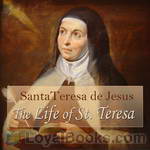 The Life of St. Teresa
The Life of St. Teresa
Saint Teresa of Ávila, also called Saint Teresa of Jesus, baptized as Teresa Sánchez de Cepeda y Ahumada, (March 28, 1515, at Gotarrendura (Ávila), Old Castile, Spain – October 4, 1582, at Alba de Tormes, Salamanca, Spain) was a prominent Spanish mystic, Carmelite nun, and writer of the Counter Reformation. She was a reformer of the Carmelite Order and is considered to be, along with John of the Cross, a founder of the Discalced Carmelites. In 1970 she was named a Doctor of the Church by Pope Paul VI. | |
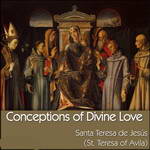 Conceptions of Divine Love
Conceptions of Divine Love
Conceptions of Divine Love was written in 1577. St. Teresa wrote this with the idea of explaining certain words found in the Book of Canticles. When her confessor read the title of her work, he ordered her to immediately burn it, which, of course, she did. But one of her nuns had copied the first seven chapters, which was then published in 1612. Here, Father John Dalton has translated only four of those chapters in 1852. | |
By: H. G. Wells (1866-1946) | |
|---|---|
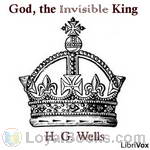 God, the Invisible King
God, the Invisible King
Wells wrote in his book God the Invisible King that his idea of God did not draw upon the traditional religions of the world: "This book sets out as forcibly and exactly as possible the religious belief of the writer. [Which] is a profound belief in a personal and intimate God." Later in the work he aligns himself with a "renascent or modern religion ... neither atheist nor Buddhist nor Mohammedan nor Christian ... [that] he has found growing up in himself." | |
By: Thomas Bulfinch (1796-1867) | |
|---|---|
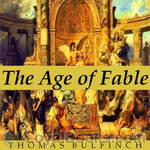 Bulfinch's Mythology: The Age of Fable
Bulfinch's Mythology: The Age of Fable
Bulfinch’s Mythology, first published in 1855, is one of the most popular collections of mythology of all time. It consists of three volumes: The Age of Fable, The Age of Chivalry, and Legends of Charlemagne. This is a recording of the tenth edition of the first volume, The Age of Fable. It contains many Greek and Roman myths, including simplified versions of The Iliad and The Odyssey, as well as a selection of Norse and “eastern” myths. Thomas Bulfinch’s goal was to make the ancient myths accessible to a wide audience, and so it is suitable for children. | |
By: John Foxe | |
|---|---|
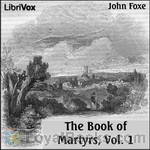 Foxe's Book of Martyrs, A History of the Lives
Foxe's Book of Martyrs, A History of the Lives
The Book of Martyrs, by John Foxe, is an English Protestant account of the persecutions of Protestants, many of whom had died for their beliefs within the decade immediately preceding its first publication. It was first published by John Day, in 1563. Lavishly illustrated with many woodcuts, it was the largest publishing project undertaken in Britain up to that time. Commonly known as, “Foxe’s Book of Martyrs”, the work’s full title begins with “Actes and Monuments of these Latter and Perillous Days, Touching Matters of the Church... | |
By: Isabella Alden (1841-1930) | |
|---|---|
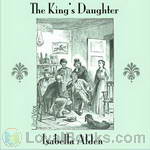 The King's Daughter
The King's Daughter
Dell Bronson has been reared in Boston by her refined uncle and aunt until, at age 18, she is called home by her father, a coarse tavern owner in Lewiston. As a daughter of the heavenly King, she strives to honor her heavenly Father by wooing her earthly father to Christ and away from rum. Set in the era of the temperance movement of the 1800’s. Authored by Isabella M. Alden under the pen name “Pansy.” Third in the Ester Ried series. | |
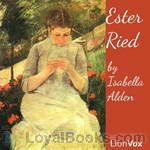 Ester Ried
Ester Ried
Authored by Isabella M. Alden under the pen name “Pansy.” Ester Ried’s life is a dull monotony of toiling at her family’s boardinghouse. She’s overworked, jealous and cranky, a poor example of a Christian to her family and associates. She awakens to a new attitude and commitment due to an extended visit with her cousin. | |
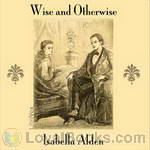 Wise and Otherwise
Wise and Otherwise
Immature Mr. Tresevant (from “The King’s Daughter”) comes to Newton with his spoiled wife to be the new pastor of the church attended by Dr. and Mrs. Douglass, Mr. and Mrs. Sayles, and Mr. and Mrs. Tyndall (from “Ester Ried” and “Julia Ried”), boarding with Jerome and Abbie Sayles. Authored by Isabella M. Alden under the pen name “Pansy.” Fourth in the Ester Ried series. | |
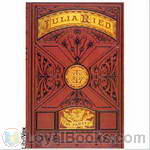 Julia Ried
Julia Ried
Authored by Isabella M. Alden under the pen name “Pansy.” Sequel to “Ester Ried.” Julia Ried must take a job as a bookkeeper in a factory to earn a living. The mistress of her boardinghouse influences her in a negative way, drawing her into a life and attitude displeasing to God. Will her family and friends be able to convince her stand up for what’s right? | |
 Four Girls at Chautauqua
Four Girls at Chautauqua
Authored by Isabella M. Alden under the pen name “Pansy.” First in the Chautauqua Girls series. Four friends – spoiled, quirky Ruth; fun-loving and mischievous Eurie; poor, independent and brainy Marion; and meek, approval-seeking Flossy – attend Chautauqua on a lark, and their lives are changed forever. (Chautauqua is an adult education movement in the United States, highly popular in the late 19th and early 20th centuries. The Chautauqua brought entertainment and culture for the whole community, with speakers, teachers, musicians, entertainers, preachers and specialists of the day.) | |